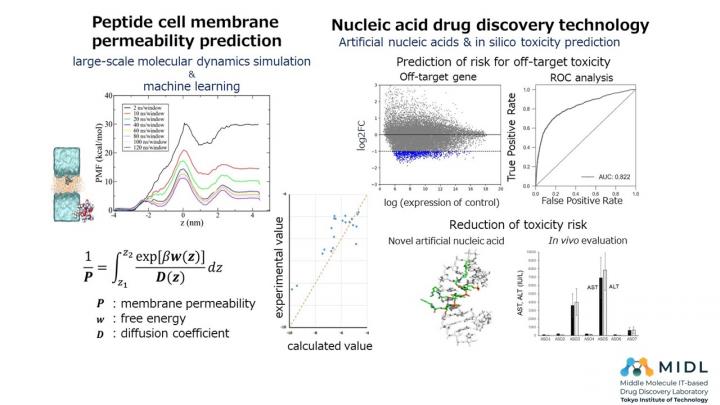Developing support projects for peptide drug discovery and nucleic acid drug discovery

Credit: MIDL
Professor Yutaka Akiyama of the School of Computing, Professor Kohji Seio of the School of Life Science and Technology, and others at Tokyo Institute of Technology (Tokyo Tech) have established Fastide, Inc. (Representative: Shinichiro Fujiie, Kawasaki City) as part of their aim to bring their research results on middle molecule drug discovery [Note 1] to society. Tokyo Tech and Fastide, Inc. are cooperating with Kawasaki City through the Program for Building Regional Innovation Ecosystems to promote integrated research of AI drug discovery and chemical synthesis technologies and are committed to creating innovative technologies and practical applications.
Background and Project Results
In September 2017, Tokyo Tech established the Middle Molecule IT-based Drug Discovery Laboratory (MIDL) with the aim of creating innovative technologies in middle molecule drug discovery such as peptide drugs and nucleic acid drugs, which are expected to be useful in next-generation drug discovery, in collaboration with Kawasaki City and the “Program for Building Regional Innovation Ecosystems under the Project for Developing Innovation Systems (Theme: Program to Industrialize an Innovative Middle Molecule Drug Discovery Flow through Fusion of Computational Drug Design and Chemical Synthesis Technology)” (hereinafter referred to as “this program”) of the Ministry of Education, Culture, Sports, Science and Technology (MEXT).
This program is proceeding with two commercialization projects: the development of IT drug discovery technologies for peptide drug discovery [Note 2] led by Professor Yutaka Akiyama, and the development of artificial nucleic acids for nucleic acid drug discovery [Note 3] led by Professor Kohji Seio. After more than three years of work, the former developed a pharmacokinetic prediction system specializing in peptide drug discovery using technologies such as large-scale molecular simulation and machine learning, and the latter established a new synthesis method for nucleic acid libraries. In addition to work such as examining business strategies and intellectual property strategies, and the building of human networks, this program was given a “Comprehensive Evaluation S” rating [Note 4], which is the highest evaluation in the interim evaluations by Ministry of Education, Culture, Sports, Science and Technology (MEXT).
Establishment of the New Company
Fastide, Inc. was established in April 2021 to carry out a project supporting middle molecule drug discovery by faculty members who are participating in MIDL with the aim of contributing to the promotion of science and technology and strengthening international competitiveness in response to requests from industries, regions, etc., that require fast practical application and commercialization of research results by further advancing these results.
Prior to the establishment of this company, a commercialization support group was formed comprised of the business producer and the business co-producer of this program, faculty members, and university research administrators (URA) of the Tokyo Tech Office of Research and Innovation to involve the entire organization in the commercialization.
Through strategic partnerships and business developments with pharmaceutical companies in Japan and other countries, and bio-venture companies, Tokyo Tech and Fastide, Inc. will promote innovative R&D and social application of results in order to promote science and technology in Japan and strengthen international competitiveness.
###
About Fastide,Inc.
https:/
[Notes]
Note 1: Middle molecule drug discovery
The process up to the development of drugs using middle molecules with a molecular weight of several hundreds to several thousands and intermediate properties between a small molecule drug (tens to several hundreds) and an antibody drug (about 150,000). The market for small molecule drug discovery is saturated, and the problem with antibody drugs is that there are limited antigens while development and production costs are high. Therefore, middle molecule drug discovery, and peptide drugs and nucleic acid drugs in particular, is attracting much attention in regard to next-generation drug discovery.
Note 2: The development of IT drug discovery technologies for peptide drug discovery
Takashi Tajimi, Naoki Wakui, Keisuke Yanagisawa, Yasushi Yoshikawa, Masahito Ohue, Yutaka Akiyama, “Computational prediction of plasma protein binding of cyclic peptides from small molecule experimental data using sparse modeling techniques”, BMC Bioinformatics, 19(Suppl 19):527, 2018. doi:10.1186/s12859-018-2529-z
Note 3: The development of artificial nucleic acids for nucleic acid drug discovery
Yoshiaki Masaki, Yusuke Iriyama, Hiroyuki Nakajima, Yusuke Kuroda, Tatsuro Kanaki, Satoshi Furukawa, Mitsuo Sekine, Kohji Seio, “Application of 2′-O-(2-N-Methylcarbamoylethyl) Nucleotides in RNase H-Dependent Antisense Oligonucleotides”, Nucleic Acid Therapeutics, 28(5):307-311, 2018. doi:10.1089/nat.2018.0738
Note 4: “Comprehensive Evaluation S” rating
MEXT “FY2019 Interim Evaluation Results of the Program for Building Regional Innovation Ecosystems” (a report in Japanese)
https:/
Tokyo Tech and Kawasaki City, combining forces in R&D on Computational Drug Discovery for Middle Molecules at KING SKYFRONT
https:/
Akiyama Lab
https:/
Kohji Seio’s Lab
http://www.
About Tokyo Institute of Technology
Tokyo Tech stands at the forefront of research and higher education as the leading university for science and technology in Japan. Tokyo Tech researchers excel in fields ranging from materials science to biology, computer science, and physics. Founded in 1881, Tokyo Tech hosts over 10,000 undergraduate and graduate students per year, who develop into scientific leaders and some of the most sought-after engineers in industry. Embodying the Japanese philosophy of “monotsukuri,” meaning “technical ingenuity and innovation,” the Tokyo Tech community strives to contribute to society through high-impact research.
https:/
Media Contact
Emiko Kawaguchi
[email protected]




